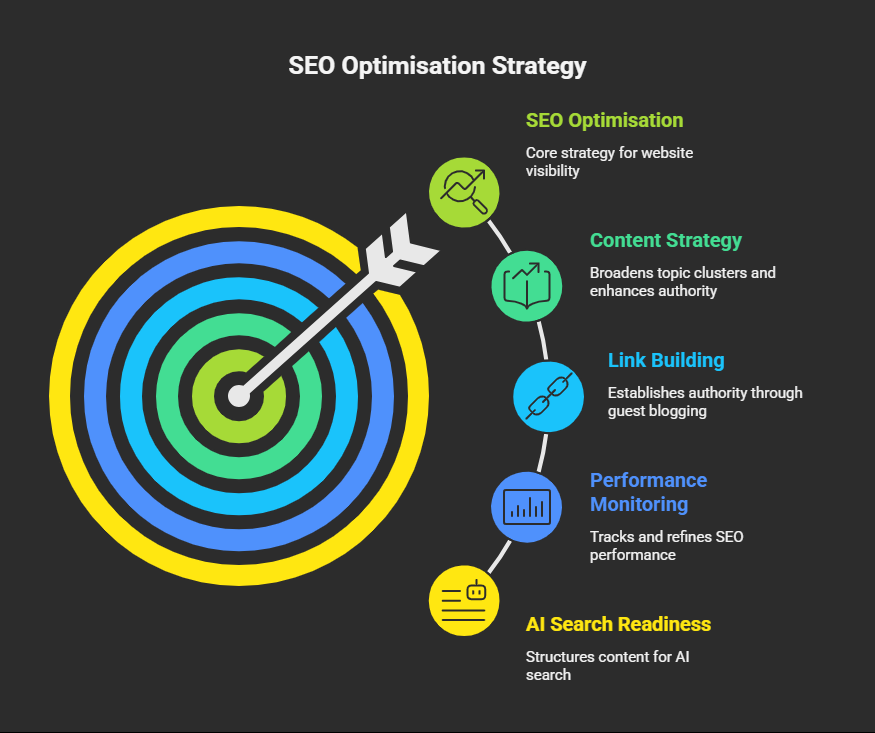Launching a new site is thrilling, yet it demands a strong strategy to get noticed. This guide offers a comprehensive SEO for new website planners and developers. It reveals actionable SEO tips for a new website and shows you how to start a new website in 2025 and beyond. You’ll learn how to align your content with user intent and AI-driven search systems. By following these pointers, you’ll build a site that performs well today and adapts to tomorrow’s search landscape.
Table of Contents
ToggleWhy SEO for a New Website Still Matters
People now use chatbots, voice assistants, and social platforms to find answers. Even so, organic search remains essential for credible traffic.:
- It helps your site become visible to people actively seeking your content or services.
- It builds trust and credibility because users trust organic search results more than ads.
- It supports cost-effective, long-term growth compared to one-time ad campaigns.
- It ensures your site performs well not only in traditional search but also in AI-led search experiences.
- It sets a foundation for voice and conversational search, which rely heavily on optimised content.
Start SEO for New Website: Pre-Launch Foundation
Before your website goes live, it’s important to lay a strong SEO foundation. Taking the right steps now will help search engines discover, crawl, and understand your site from day one.
- Begin with keyword research to identify the terms your target audience actually uses. Build your main landing pages and blog content ideas around these keywords.
- Select a responsive theme or template that works well on both desktop and mobile, and make sure your hosting is fast and secure. Using a CDN can further boost your website’s speed and reliability.
- Set up your site with HTTPS for security and trust. Organise your site structure logically, using SEO-friendly URLs with clear slugs for every page.
- Upload essential technical files, including an XML sitemap and robots.txt, so search engines can crawl your website without issues.
- Add schema markup for your key content like FAQs, articles, events, or products, so search engines better understand your site.
- Prepare for Core Web Vitals by running performance checks, compressing images, using browser caching, and making sure your page layout stays stable.
Step – SEO for New Website at Launch
After your site goes live, it’s time to think about on-page SEO and content hierarchy.
- Optimise your on-page SEO by creating different, keyword-rich titles and headings for each page. Add enticing meta descriptions (approximately 150 characters) to increase click-throughs in search listings.
- Use descriptive alt tags on all images and include clear, descriptive captions where appropriate. Ensure your navigation is clean and internal links have descriptive anchor text.
- Launch with 3 to 5 pillar pages that address your top subjects in detail, and link those to supporting cluster articles to create topical authority.
- Organise your content to respond to frequently asked user questions to improve your opportunities for featured snippets and zero-click results.
- Implement schema markup for articles, products, FAQs, and breadcrumbs to give search engines additional information.
- Make your site completely mobile-friendly and accessible, with simple navigation and fast-loading content on any device.
SEO Process for New Website: Ongoing Optimisation
SEO does not stop once your site is launched. Ongoing optimisation is the key to staying competitive and keeping your website ranking on search engines.

- Broaden your topic clusters through frequent publication of new, related content and back-linking them to your pillar pages in a hub-like structure.
- Establish your authority and backlinks organically by guest blogging on quality sites, producing shareable and useful resources, and connecting with industry outlets.
- Keep tabs on your SEO performance through analytics to monitor organic traffic, bounce rates, clicks, and user behaviour. Refine your content and technical SEO accordingly.
- Regularly review your site for AI search readiness by structuring answers clearly, adding bullet points for important definitions, and updating Q&A sections.
- Update your schema markup, metadata, and older content frequently so your site stays relevant to both search engines and AI-driven results.
- Keep an eye on competitor strategies and evolving SEO trends to stay ahead and continuously improve your approach.
SEO Tips for a New Website
It’s easy to overlook the details as your website grows, but sticking to proven SEO tips helps you maintain your ranking and build authority.
- Always choose keywords based on user intent, not just search volume, to attract the right visitors to your site.
- Write content that clearly and fully answers the questions your audience is searching for. Quality trumps quantity.
- Optimise every part of your site for Core Web Vitals and fast loading speeds, especially on mobile devices.
- Use structured data and schema markup to give your content more visibility in search results.
- Share your best content across social media and email newsletters to encourage backlinks and build your brand.
- Conduct quarterly audits to spot and refresh outdated pages, keeping your website healthy and competitive.
Quick Comparison Table
This table highlights performance indicators and tools:
| Task | Goal | Recommended Tool |
| Keyword Research | Select relevant, intent-aligned terms | Ahrefs, SEMrush, and free keyword tool |
| Site Speed Optimisation | Improve load time and interactive speed | PageSpeed Insights, Lighthouse |
| Site Structure and URLs | Ease navigation and indexing | WordPress Permalink setup, Screaming Frog |
| Schema Markup | Enhance detection by AI and bots | Schema plugin or Google Tag Manager |
| Content Planning | Build authority with topic clusters | Editorial calendar planners |
| Backlink Building | Gain third-party reference and trust | Outreach, HARO, guest post platforms |
| Analytics & Performance | Evaluate progress and optimise further | Google Analytics, Search Console |
| AI Answer Optimisation | Earn visibility in AI overviews | Add clear Q&A, ‘definition’ bullets |
Read More :- White Hat SEO Firm Secrets: 7 Strategies That Actually Work in 2025
Frequently Asked Questions
Q1: How quickly will I notice SEO’s effects after creating a new website?
Ans. SEO is a long-term strategy. A majority of new websites begin noticing movement in terms of rankings and traffic within six months if best practices are adhered to. Outcomes can differ depending on competition, the industry, and the frequency with which you optimise.
Q2: Why is mobile optimisation crucial for SEO?
Ans. Mobile optimisation ensures that your website is fast to load and appears awesome across every device, particularly smartphones. Search engines like Google rank mobile-friendly sites higher. A smooth mobile experience not only enhances your SEO but also retains users and lowers bounce rates.








